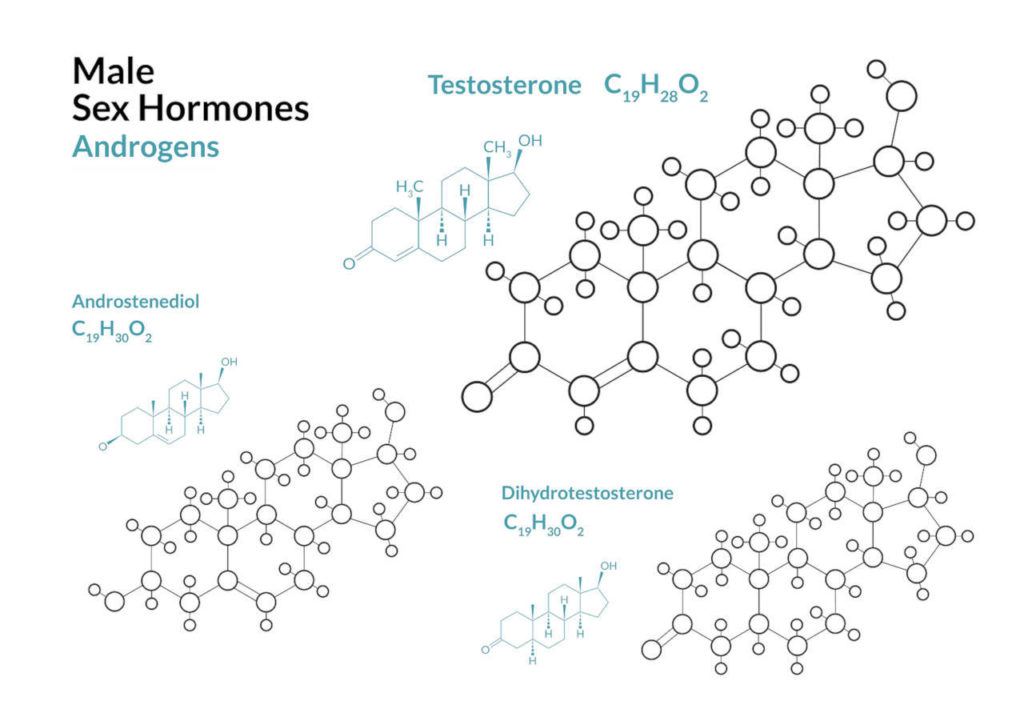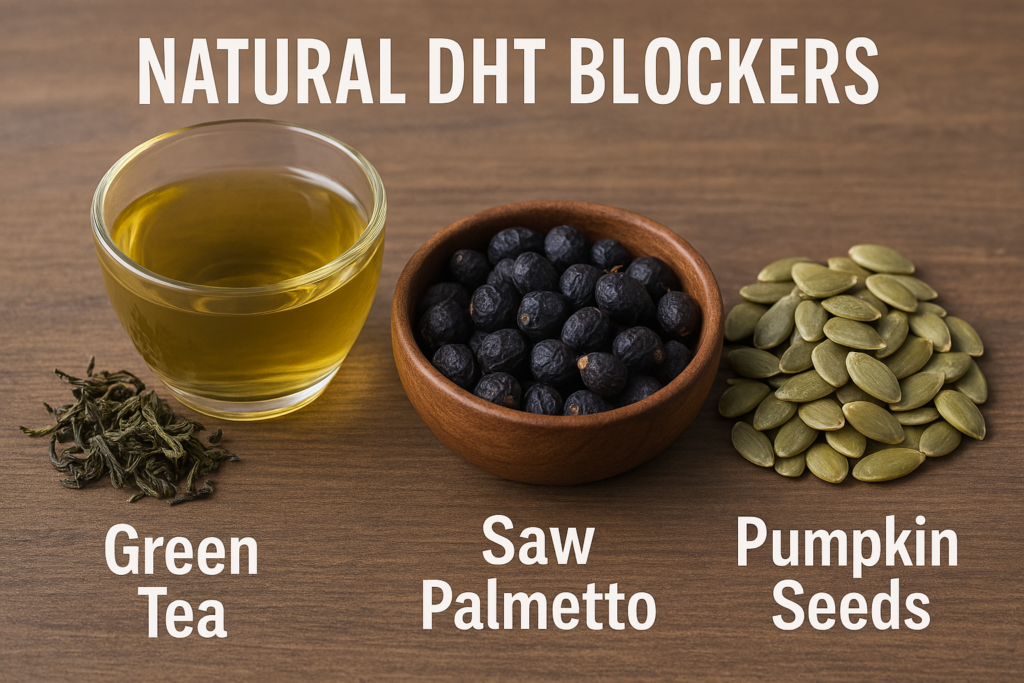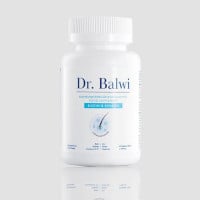
The Ultimate Guide to DHT Blockers
If you’ve been struggling with hair loss, chances are you’ve heard about DHT blockers. But what are DHT blockers, and how do they work? In this article we’ll be taking a look at how hormones affect hair health, how blockers work, who can benefit from them, and when to consider alternative treatments like hair transplants.
Summary
- Understanding DHT and Its Role in Hair Loss
- How Do DHT Blockers Work?
- Top Prescription DHT Blockers: Finasteride and Dutasteride
- Natural DHT Blockers: Foods and Supplements
- Potential Side Effects of DHT Blockers
- Who Are DHT Blockers For?
- How Long Does It Take DHT Blockers To Work?
- Alternatives to DHT Blockers for Hair Loss Treatment
Understanding DHT and Its Role in Hair Loss

Dihydrotestosterone (DHT) is an androgen derived from the hormone testosterone. Testosterone is typically responsible for secondary sex characteristics in men like a deep voice, facial hair, or more muscle mass.
Testosterone is converted to DHT with the help of the enzyme 5-alpha reductase. This enzyme is stored in the oil glands of a hair follicle.
Follicle miniaturisation occurs when DHT binds to androgen receptors in hair follicles. Smaller follicles will cause the anagen hair growth phase to shorten (hair has less time to grow) and the telogen phase to lengthen (a hair follicle will rest instead of producing more hair). This creates a gradual decline in overall hair regrowth, with hair thinning and eventually leading to hair loss.
Some men are more sensitive to DHT hair loss due to underlying genetics. Certain genes can cause DHT to bind more easily to androgen receptors, accelerating follicle shrinking. Thus, in order to prevent hair loss, the production of DHT must be blocked or its function restricted.
How Do DHT Blockers Work?
DHT blockers are treatments (medicine, shampoos, and natural foods) that stop DHT attacking the hair follicles and making them shrink. In order to stop DHT from attacking hair follicles, DHT must be blocked. However, this blockage occurs without knowing the amount of testosterone in the body. A decrease in testosterone could lead to a hormone imbalance.
This negative effect can be avoided while still reducing DHT by inhibiting the function of 5-alpha reductase or by blocking DHT from binding to the androgen receptors.
Top Prescription DHT Blockers: Finasteride and Dutasteride
The two main types are blockers (preventing DHT from binding to 5-AR receptors) and inhibitors (reducing the production of DHT in your body). There are many different forms of DHT blockers such as prescription medicine, shampoos and conditioners and natural foods and supplements.
DHT blocker tablets are available on prescription but come with their own risks and potential side effects:
- Finasteride: an oral tablet prescribed to reduce the effect of male pattern baldness
- Dutasteride: an oral tablet prescribed for men to reduce hair loss
- Minoxidil (Regaine): tablet or lotion that can be used on the scalp.
- Biotin: taken orally or from foods such as egg yolks, nuts and whole grains
Natural DHT Blockers: Foods and Supplements

There are many ways to naturally reduce DHT, and while DHT hair loss cannot be completely avoided, the good news is that there are many foods, vitamins, and supplements that may help slow down the progression of hair loss in men. Here are three natural DHT blockers which have been linked to a reduction in hair loss:
- Saw palmetto: an extract derived from the berries of the saw palmetto palm tree (Serenoa repens). Research suggests saw palmetto may be able to inhibit the activity of 5-alpha reductase and can therefore function well as a DHT blocker food.
- Pumpkin Seed Oil: Like many oils, it has long been proven as a way to promote and maintain healthy hair growth. Research has shown that pumpkin seed oil can play a role in the decrease of DHT by inhibiting the action of 5-alpha reductase. It is also high in zinc. The body cannot produce this trace element on its own, so it must be supplied through food and/or supplements. Too high of a dose of zinc can be damaging, so it is advised to monitor intake carefully. Foods that contain zinc: oysters, shellfish, meats, baked beans, breakfast cereal.
- Green Tea: Studies have shown that the epigallocatechin gallate found in green tea can prevent DHT-mediated cell death, suggesting that green tea can be used as a natural DHT-blocker.
One substance that you might want to consider avoiding is caffeine. A study suggests that chronic caffeine intake could actually lead to an increase in DHT.

Potential Side Effects of DHT Blockers
There are some negative DHT blocker side effects to understand. While they are often considered the best DHT blocker solutions, there can be some more severe side effects, such as:
- Ejaculation problems
- Erectile dysfunction
- Decreased sex drive
- Tenderness or excess fat in the breast area
- Rash
Research suggests that DHT blockers can slow down hair loss while potentially promoting regrowth, so it may seem a very reasonable solution if you are faced with this type of alopecia. To lessen risks, any treatment for DHT hair loss should always be discussed with your healthcare provider.
However, the negative side effects of such treatment options shouldn’t be ignored. Additionally, once you stop using DHT blockers, your hair will start falling out again. Hair surgery is the better alternative if you are looking to treat male pattern baldness permanently.
Who Are DHT Blockers For?
DHT blockers are aimed at men looking for treatment for hair thinning and male pattern baldness. However, DHT blockers should not be used if you’re under 18 or over 65 years of age, or if you’re due a blood test for prostate-specific antigens, if you have high blood pressure, have any allergies to the ingredients, or if you have a scalp condition such as psoriasis.
For women, it is slightly more complicated and any woman seeking medication for hair loss should discuss her options with her doctor. A course of DHT-blockers always depends on your specific cause of hair loss, regardless of your gender. For women suffering from PCOS (Polycystic Ovarian Syndrome), drugs like Spironolactone may be prescribed. Spironolactone is often used as a DHT blocker for women.
How Long Does It Take DHT Blockers To Work?
There are many different forms of DHT blockers, but a treatment for hair loss such as Finasteride (Propecia) can take from three to six months before any effect is seen, even if taken daily.
Alternatives to DHT Blockers for Hair Loss Treatment
If you suffer from hair loss issues, there are alternatives to DHT blockers and the risks associated with them.
Elithair has a team of medical advisors and a thorough 6 step process to help assess the best hair loss treatment for you and your wellbeing.
We also offer a range of products to assist in your hair restoration. Book your free consultation and hair analysis to find a permanent solution to your male pattern baldness.
FAQ
Can women use DHT blockers for hair loss treatment?
While most DHT blockers are aimed at men, some, like Spironolactone, can be used by women. However, women should consult their healthcare provider before using any DHT blocker due to potential side effects and hormonal impacts.
What lifestyle changes can help reduce DHT levels naturally?
Lifestyle changes such as reducing stress, maintaining a balanced diet rich in zinc and other nutrients, regular exercise, and avoiding excessive caffeine and sugar intake can help reduce DHT levels naturally.
Are DHT blockers effective for everyone experiencing hair loss?
DHT blockers are most effective for those with androgenetic alopecia (male or female pattern baldness). Their effectiveness may vary depending on individual genetic factors and the stage of hair loss.
What are the potential long-term effects of using DHT blockers?
Long-term use of DHT blockers can lead to persistent side effects such as sexual dysfunction, hormonal imbalances, and potential liver issues. Continuous monitoring by a healthcare provider is recommended.
Can DHT blockers be used in conjunction with other hair loss treatments?
Yes, DHT blockers can often be used alongside other treatments like minoxidil, PRP therapy, and hair transplants. Combining treatments may enhance overall effectiveness but should be done under medical supervision.
How do diet and nutrition influence DHT levels and hair health?
A diet rich in vitamins and minerals, particularly zinc, biotin, and omega-3 fatty acids, can support hair health and potentially reduce DHT levels. Foods such as nuts, seeds, leafy greens, and lean proteins are beneficial.
What is the difference between prescription and over-the-counter DHT blockers?
Prescription DHT blockers, like finasteride and dutasteride, are typically stronger and have more documented side effects. Over-the-counter options, including certain shampoos and natural supplements, are generally milder but may be less effective.


